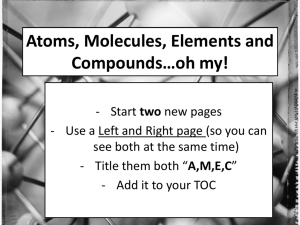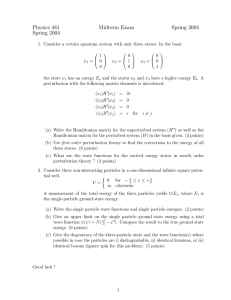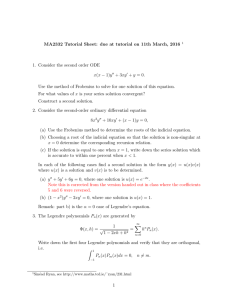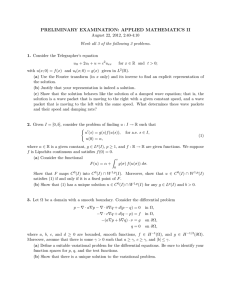LOYOLA COLLEGE (AUTONOMOUS), CHENNAI – 600 034
advertisement
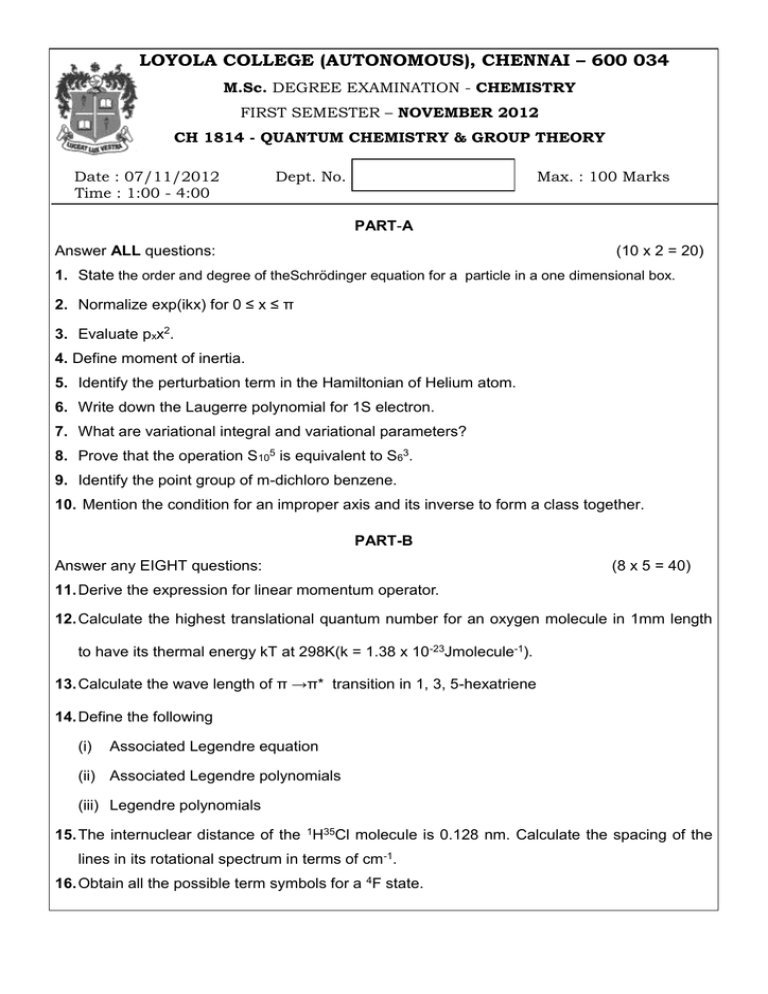
LOYOLA COLLEGE (AUTONOMOUS), CHENNAI – 600 034 M.Sc. DEGREE EXAMINATION - CHEMISTRY FIRST SEMESTER – NOVEMBER 2012 CH 1814 - QUANTUM CHEMISTRY & GROUP THEORY Date : 07/11/2012 Time : 1:00 - 4:00 Dept. No. Max. : 100 Marks PART-A Answer ALL questions: (10 x 2 = 20) 1. State the order and degree of theSchrödinger equation for a particle in a one dimensional box. 2. Normalize exp(ikx) for 0 ≤ x ≤ π 3. Evaluate pxx2. 4. Define moment of inertia. 5. Identify the perturbation term in the Hamiltonian of Helium atom. 6. Write down the Laugerre polynomial for 1S electron. 7. What are variational integral and variational parameters? 8. Prove that the operation S105 is equivalent to S63. 9. Identify the point group of m-dichloro benzene. 10. Mention the condition for an improper axis and its inverse to form a class together. PART-B Answer any EIGHT questions: (8 x 5 = 40) 11. Derive the expression for linear momentum operator. 12. Calculate the highest translational quantum number for an oxygen molecule in 1mm length to have its thermal energy kT at 298K(k = 1.38 x 10-23Jmolecule-1). 13. Calculate the wave length of π →π* transition in 1, 3, 5-hexatriene 14. Define the following (i) Associated Legendre equation (ii) Associated Legendre polynomials (iii) Legendre polynomials 15. The internuclear distance of the 1H35Cl molecule is 0.128 nm. Calculate the spacing of the lines in its rotational spectrum in terms of cm-1. 16. Obtain all the possible term symbols for a 4F state. 17. Prove the commutation relation [p2x, x] = -2iћp. 18. Illustrate the Pauli Exclusion Principle for the ground state of He atom. 19. At what distance from the nucleus is the probability of finding the electron a maximum for a 1S electron in hydrogen? 20. While the order is the same for both C3v and C3h point groups, their classes are different reason out. 21. Allene belongs to D2d point group. Identify the order and hence the number and dimensionality of the irreducible representations. 22. Set up the secular determinant for allyl radical and obtain its energy levels. PART-C Answer any FOUR questions: (4 x 10 = 40) 23. (a) Define the following: (i) Closed interval (ii) Even function (iii)Orthonormal set of functions. (b) Get the following polynomial functions for a rigid rotor: (i) P00(cosθ) (ii) P10(cosθ) 24. Calculate the wave length of π →π* transitionof the following molecule: (Bond distances: C-C, 0.154 nm; C=C, 0.133 nm) 25. Set up the Schrodinger equation for a rigid rotor and hence solve for its energy and wave functions. 26. State the principle of Perturbation theory and use first order perturbation theory to calculate the energy of a particle in a one dimensional box from x = 0 to x = a with a slanted bottom, such that Vx = V0 (x)/a. Given the wave function Ψ(0) = (2/a)1/2 sin (nπx/a). 27. a)Solve the polar angle dependent equation for Hydrogen atom. b) Highlight the important approximations that distinguish the HMO method from other LCAO methods. 28. Work out the hybridization scheme for σ bonding by carbon in CH 4 molecule of Td point group symmetry, using the character table given below. Td E 8C3 3C2 6S4 6σd A1 1 1 1 1 1 A2 1 1 1 -1 -1 E 2 -1 2 0 0 T1 3 0 -1 1 -1 (Rx, Ry, Rz) T2 3 0 -1 -1 1 (x, y, z) x2+y2+z2 (2z2-x2-y2, x2-y2) ********* (xy, xz, yz)
